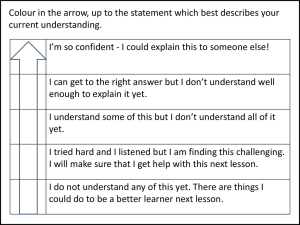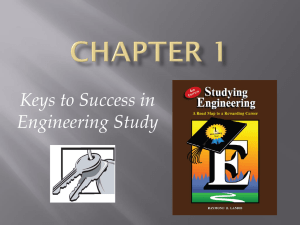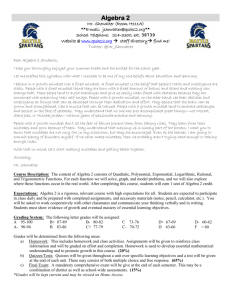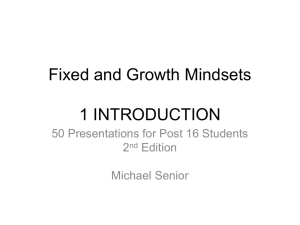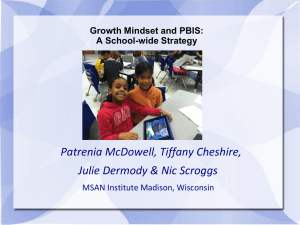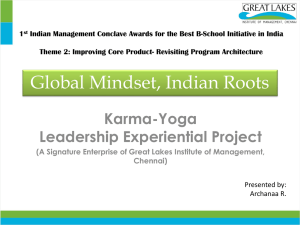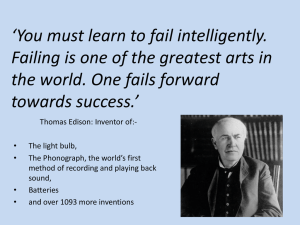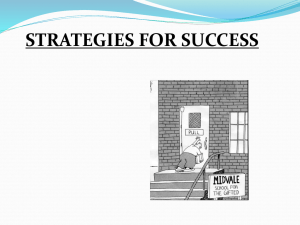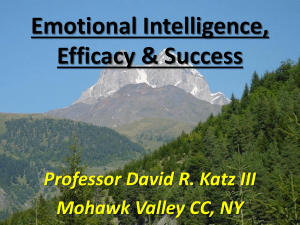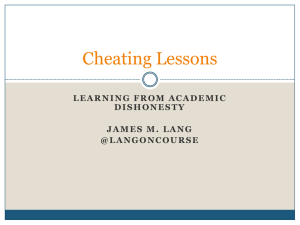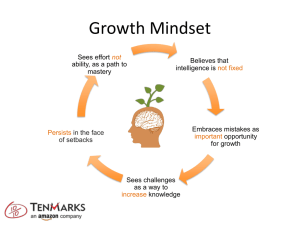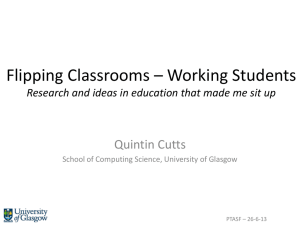Growth Mindset LF - Learning Forward Conference Proposal
advertisement
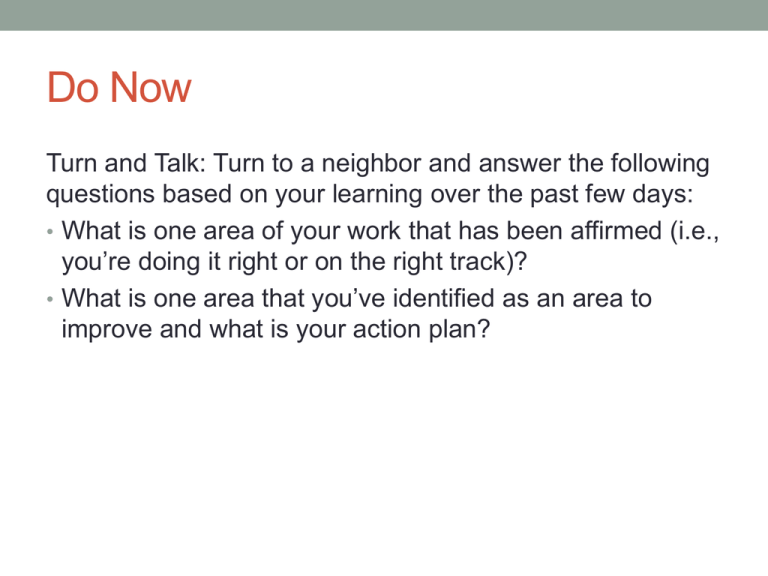
Do Now Turn and Talk: Turn to a neighbor and answer the following questions based on your learning over the past few days: • What is one area of your work that has been affirmed (i.e., you’re doing it right or on the right track)? • What is one area that you’ve identified as an area to improve and what is your action plan? USING FEEDBACK TO FOSTER A GROWTH MINDSET Melissa McConnell, Principal, Collierville Elementary, Collierville, TN Rachel Lebo, Director of PD, JacksonMadison County Schools, Jackson, TN Resilience Grit Persistence Growth Mindset http://youtu.be/pN34FNbOKXc Turn and Talk • How does this translate to teachers and principals? What are the characteristics of a teacher or principal with a fixed mindset? Growth mindset? • Which do you want and why? 6 From Individual Feedback to a Culture of Continuous Learning “If, like those with the growth mindset, you believe you can develop yourself, then you're open to accurate information about your current abilities, even it it's unflattering. What's more, if you're oriented toward learning, as they are, you need accurate information about your current abilities in order to learn effectively” -Carol Dweck, Mindset 7 The Research From The Ripple Effect: “For example, when researchers examined the effectiveness of data-use initiatives, they found that student learning gains occurred as a result of such initiatives only when the principal in charge held the belief that improvement was possible” -Wahlstrom, Seashore-Louis, Leithwood, & Anderson Characteristics of Growth vs Fixed Mindset You Can Teach a Growth Mindset! • Avoid labels and fixed-mindset praise • Celebrate deliberate practice, process and progress, not outcomes • Create a culture where learning and risk-taking are valued • Be transparent with your own effort, learning and mistakes • Focus your feedback around process and progress, not scores or metrics Turn and Talk • How does the teacher evaluation framework in your district foster a growth mindset? How does it create obstacles? You Can Teach a Growth Mindset! • Avoid labels and fixed-mindset praise • Celebrate deliberate practice, process and progress, not outcomes • Create a culture where learning and risk-taking are valued • Be transparent with your own effort, learning and mistakes • Focus your feedback around process and progress, not scores or metrics Teacher evaluation that fosters growth mindset would be: • Focus on formative assessment and provide room to • • • • learn from mistakes Focus on self-reflection and learning Label strategies not people Focus on process, not outcomes Focus on feedback, not labels You can shift the focus… • Focus on formative • • • • assessment and provide room to learn from mistakes Focus on self-reflection and learning Label strategies not people Focus on process, not outcomes Focus on feedback, not labels Provide multiple opportunities for un-scored formative feedback Build in opportunities for self-reflection Change the structure and/or content of your preand post-conferences Provide Multiple Opportunities for Feedback Build in Opportunities for SelfReflection • Goal-setting • Self-assessment • Analysis of student work Change the Structure of Your PostConference Feedback is one of the most powerful influences on learning and achievement, but this impact can be either positive or negative. Its power is frequently mentioned in articles about learning and teaching, but surprisingly few recent studies have systematically investigated its meaning…. This evidence shows that although feedback is among the major influences, the type of feedback and the way it is given can be differentially effective. --J. Hattie All Feedback is Not Created Equal http://vimeo.com/38247060 Turn and Talk • What were the elements of effective feedback that you observed? Effective Feedback • Goal-referenced • Specific • Actionable • User-friendly • Timely Restructure Your Post-Conference • Frame the conversation: • Ask your teacher what students were expected to know and be able to do at the end of the lesson? How do you know this is the right goal to eventually lead to mastery of the standard? Restructure Your Post-Conference • Spend time discussing an area of strength: • Ask teacher what went well and why. • Focus on the process that led the teacher to this area of strength “How did you learn to do this?” “How do you know it’s effective?” • How might this be similarly effective with other lessons? Restructure Your Post-Conference • Help the teacher identify the area that, if improved, would have the greatest impact on the stated goal: • Use questions that again focus on process and not outcomes • Make it clear that you are carving out a space for learning, not judgment • Focus the conversation on student learning, not teacher actions Focus Questions on Process and Learning • What did you do to prepare for this? • • • • • • • Describe your process for planning a lesson/teaching this skill/… How much progress have your students made on this? What have been the most significant drivers of that progress and how do you keep that going? What could be better and what would that mean for kids? How to do you get there? How might you improve the way students engaged in X? Can we practice that skill together? What was the most challenging thing about teaching this lesson? How did you prepare for that and how might you prepare for it differently next time? How did you learn to do this and was it always as effective as it was today? Turn and Talk • What are the unique challenges in providing feedback to your most effective teachers? How can you shift the emphasis in the post-conference to make this a more meaningful conversation for them? Turn and Talk • What are the implications of the Growth-Mindset research for your ‘level 5’ teachers? 5 attributes of a teacher with a growth mindset: • They take responsibility for improving their practice • They see setbacks and feedback as an opportunity to learn and grow their skills • They actively seek learning opportunities and new challenges • They have positive and high expectations of their students • They use growth mindset language when teaching and with themselves It’s okay not to know. It’s okay not to know. ..yet Thank you! • Rachel Lebo, rglebo@jmcss.org • Melissa McConnell, mmcconnell@colliervilleschools.org
